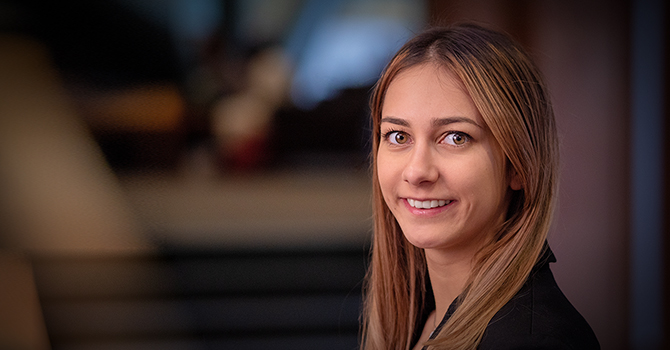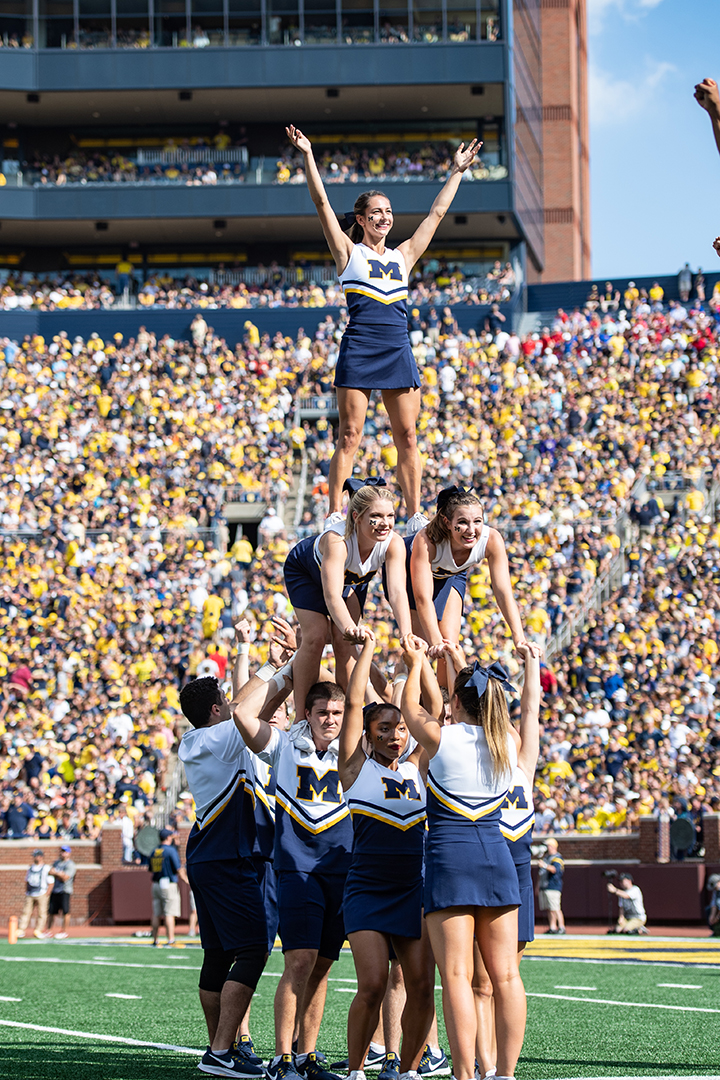Outside the Exam Room: Looking across Professions to Improve Health Outcomes

Rylee Doucette, MPH '19
I grew up in Michigan’s Upper Peninsula, and health care access was definitely an issue. But I had to move away to realize it was an issue. It is something people talk about and want to correct, but it’s also normative and difficult to address. It relates to provider access, too, especially for referrals. We often had to travel for care, which was a time commitment for my parents to take time off of work, stay in hotels, and spend gas money. I broke my ankle once, and we had to drive a few hours to have the surgery and scans done. I had to have gum surgery another time and there was only one person in the entire upper peninsula who was qualified to perform the surgery.
I’m planning to attend medical school, and I’ll enter with a graduate degree in public health. I started at Michigan knowing that I wanted to go to med school but hadn’t selected a major. I started taking psychology classes and became really interested in human behavior. When I heard about the new undergraduate public health major, I was really intrigued but the timing wasn’t right for me. Then I learned about the four-plus-one program here in the School of Public Health, which allowed me to do my four years of undergrad and then add just one more year of graduate courses to complete a master’s. All my pre-med requirements ended up working into that program too, so I had to take only a few additional classes to complete the biomedical sciences undergrad major.
Our health system is very illness-focused. We need to pivot to avoid people even needing to see a provider in the first place.
Thankfully, training in the medical field right now has a cross-functional emphasis, which resonates well with my public health perspectives. In my interprofessional course, we have students from dentistry, medicine, public health—and we’ve spent much of our time discussing prevention. Our health system is very illness-focused. We need to pivot to avoid people even needing to see a provider in the first place.
Public health is going to play a huge role in health care for years to come. Health systems are burdened, we have huge shortages of providers and nurses. We need more and more programs focused on prevention, especially in places like the UP, where you have an exacerbated physician shortage. It is really proving to be a good decision to take this year before med school to complete my master’s degree in public health, because in med school I think I can provide perspectives that are fresh for me and I think will be fresh for my peers in the program.
So many health decisions are made outside the physician’s exam room.
I want to help my future patients not only get healthier but empower them to take care of their own health: I want to make the whole community healthier. So many health decisions are made outside the physician’s exam room.
My psychology training has really helped as I've discovered health care’s shift to include motivational and interactive components. I have pretty extensive training in motivational interviewing, and information often is not enough to get a patient to make a behavior change. You have to understand human behavior and motivating factors: What are the patient’s goals and values?
I work now as a basic facilitator for Wolverine Wellness in a program called BASICS, which is an acronym for brief alcohol screening intervention in college students. We get students who are mandated to come in and see us for various reasons. Often it’s an alcohol-related hospitalization that mandated the screening, and we try to approach that conversation with them with motivational interviewing.
I love motivational interviewing and would love to see it play out in a health care context. Motivational interviewing is about recognizing patient autonomy and knowing that the patient is the expert of themselves. So you might have a lot of medical knowledge but really need to know more about your patient’s home environment and other factors in their life. You need to work as a partner to identify barriers to their care and identify protective factors that are available to them. But you won’t get to those insights for that patient if you don’t listen to them carefully.
Sometimes you can’t internalize how much all these things play a factor in life and health until it’s someone you know.
 I can see every day how my public health training is preparing me for a career as
a physician. In an environmental health exposures class, we looked at occupational health hazards.
This opened my eyes to how certain conditions I’ll see, like chronic asthma, may be
caused by conditions at someone’s place of work. It also made me think about my dad—who
works in a paper mill—when we talked about sleep and sleep patterns and how people
working night shifts often disturb their circadian rhythms, which can have tremendous
impacts on their health. My dad works night shifts all the time. Sometimes you can’t
internalize how much all these things play a factor in life and health until it’s
someone you know
I can see every day how my public health training is preparing me for a career as
a physician. In an environmental health exposures class, we looked at occupational health hazards.
This opened my eyes to how certain conditions I’ll see, like chronic asthma, may be
caused by conditions at someone’s place of work. It also made me think about my dad—who
works in a paper mill—when we talked about sleep and sleep patterns and how people
working night shifts often disturb their circadian rhythms, which can have tremendous
impacts on their health. My dad works night shifts all the time. Sometimes you can’t
internalize how much all these things play a factor in life and health until it’s
someone you know
There are a few ways I’ll be able to help improve health outcomes in the UP even if I don't end up there full-time. New technologies are providing new options to use telemedicine. I do know quite a few providers who spend a few days a month in more remote areas of the state providing care. I could see that working for me. It’s exciting to think of the many ways to give back to the community in which I grew up.
It’s pretty amazing to be at the Big House and cheer in front of 110,000 people!
The other big part of my college experience has been cheerleading. When I started at Michigan, I knew I needed to focus on academics and really find my way. At the end of my first year, I realized how hard it was to work out or be active when you don’t have a reason, some accountability. I did gymnastics and cheered in high school, so I tried out for the club cheerleading team here and made it. I did that for a year and enjoyed it so much I decided to try out for the varsity team and ended up making that too. So this is my third year on the team. In my second year I tore my ACL and was off for the whole year—and I just felt kind of cheated. So I decided to keep going in grad school. It’s pretty amazing to be at the Big House and cheer in front of 110,000 people!
Rylee Doucette earned an MPH from the University of Michigan School of Public Health
in Health Behavior and Health Education and a BS in biomolecular science from the
University of Michigan.
